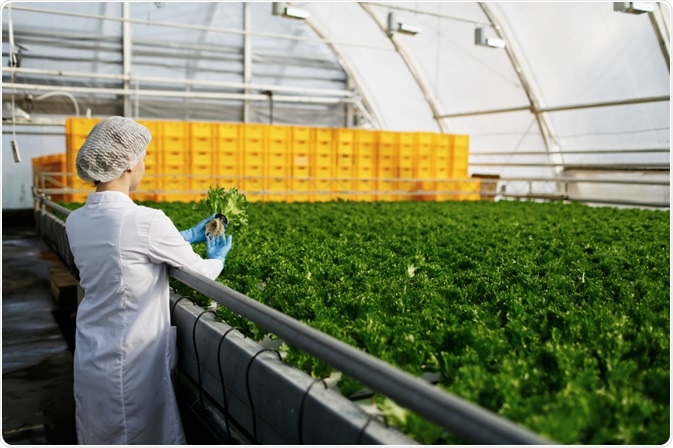Image Credit: nut3d/Shutterstock.com
The emerging field of food science
Quality control is crucial to the food science industry. The emerging discipline exists to address real problems in the food industry, drawing together experts from the fields of biology, chemistry, microbiology, nutrition, and even engineering to provide innovative solutions to the biggest challenges faced by food companies today.
The food industry developed essentially to provide food products to consumers, allowing them to conveniently and safely cook meals at home. Bringing the farm to the home, and developing new food products, expanding the possibilities of cooking and nutrition.
Recent decades have seen increasingly complex demands on the food industry, from the needs of more adventurous, educated, and health-conscious consumers, as well as from the pressures of government health agencies who are increasingly implementing initiatives to address national health problems through diet.
The food science industry was born out of these increasingly complex challenges, such as consumers demanding more meat-free and vegan options, governments pressuring food producers to drastically reduce the salt content of their products, our increasing demand for convenience products, and our growing knowledge of the relationship between food and health fueling a need for food products that meet a multitude of nutrition goals.
Food science strives to understand the complex chemistry/biochemistry of food, to address the food industry’s constantly evolving demands. Food science helps to develop new food products that meet the high quality, safety, and nutrition standards that have always been the hallmark of the food industry.
The purpose of quality control in food science
In developing new consumable products, the food science industry is required to carry out stringent quality control procedures, primarily, to ensure the safety of the food. Given that the end product is destined for human consumption, it is of utmost importance that products being developed by food science continue to meet high safety standards.
Additionally, quality control is vital for ensuring that consumers simply get the product that they expect, in terms of quality, taste, texture, size, shape, shelf life, and smell. This is vital in ensuring food companies retain the trust and loyalty of their customer base.
Further to this, quality control is employed by the food science industry to ensure that the food products being developed adhere to the food laws within the countries destined to receive the product.
How is quality control carried out in food science?
Usually, companies operating within the food science sector follow a regime of processes that ensure the products being developed meet certain quality standards. Quality control can be proactive. It can prevent the detrimental impact of failing quality standards before it happens.
Proactive quality control processes are put in place to prevent a defect before it occurs, for example, this could be anything from checking the functioning of machinery, taste testing and visually inspecting food items, to scanning products to check for contamination. The ultimate aim of these activities is to develop production methods of a food item that are reliable and aren’t prone to defects, therefore, creating consistently high-quality food each time.
Quality control processes can also be reactive. Processes are implemented by food science companies that have the aim of identifying and correcting a default that would result in a product failing quality control checks. These methods remove faulty items from production runs before they are shipped.
Reactive methods can also be used to locate a wider problem in the food production system, alerting scientists to parts of the production that may be failing, or are not reliable enough to produce consistently high-quality products. This helps scientists decide how to develop and evolve their food production methods.
It is generally agreed upon that good quality control procedures involve a sophisticated quality management system, one that has been developed to assess quality at each stage of the production process. It is also agreed that successful systems are those where each member of the team holds responsibility for quality control.
Often, food quality control systems must meet specific requirements, those laid out by the governing bodies of the country in which the food company is operating in. For example, numerous countries enforce Good Manufacturing Practices (GMP) and the system Hazard Analysis and Critical Control Points (HACCP). These standards can be used to guide companies in their quality control practices by outlining standards that must be met.

Image Credit: WAYHOME studio/Shutterstock.com
Quality control: Vitally important in food science
Without quality control in food science, the industry would not be able to develop new food products to meet the ever-changing and increasingly complex demands of today’s consumer. Quality control allows scientists to create innovative food items that respond to various needs, as well as continuing to improve the quality of food available to consumers. Therefore, it is vitally important.
Sources:
- Hobbs, J., and Kerr, W., 2014. Costs, Benefits, and Economic Issues. Encyclopedia of Food Microbiology, pp.518-523. https://www.sciencedirect.com/science/article/pii/B978012384730000077X
- Khachatourians, G., 2014. BIOCHEMICAL AND MODERN IDENTIFICATION TECHNIQUES | Food Spoilage Flora. Encyclopedia of Food Microbiology, pp.244-249. https://www.sciencedirect.com/science/article/pii/B9780123847300000355
- Liboreiro, C., 2013. Quality Management: Important Aspects for the Food Industry. Food Industry. www.intechopen.com/.../quality-management-important-aspects-for-the-food-industry
Further Reading